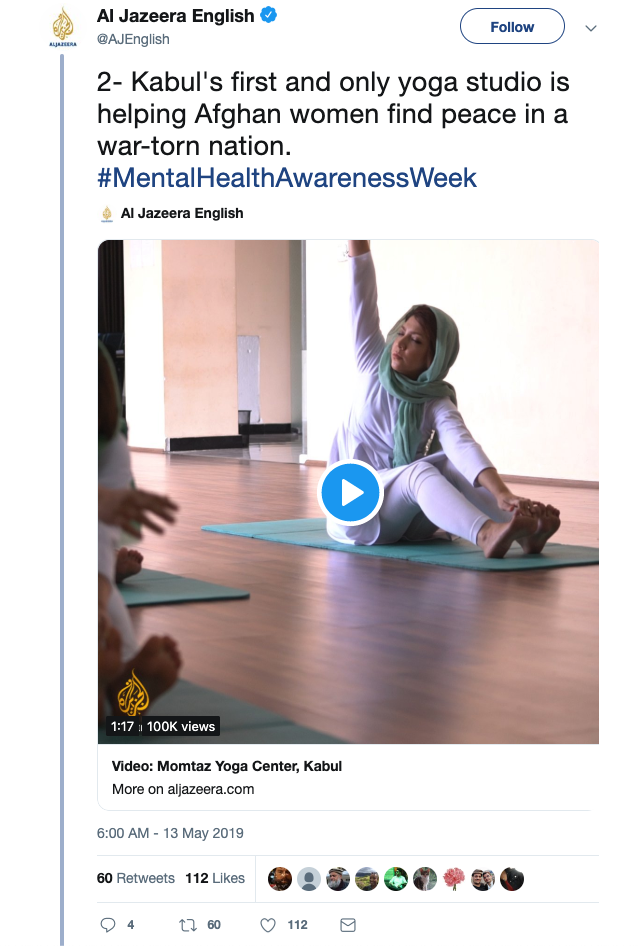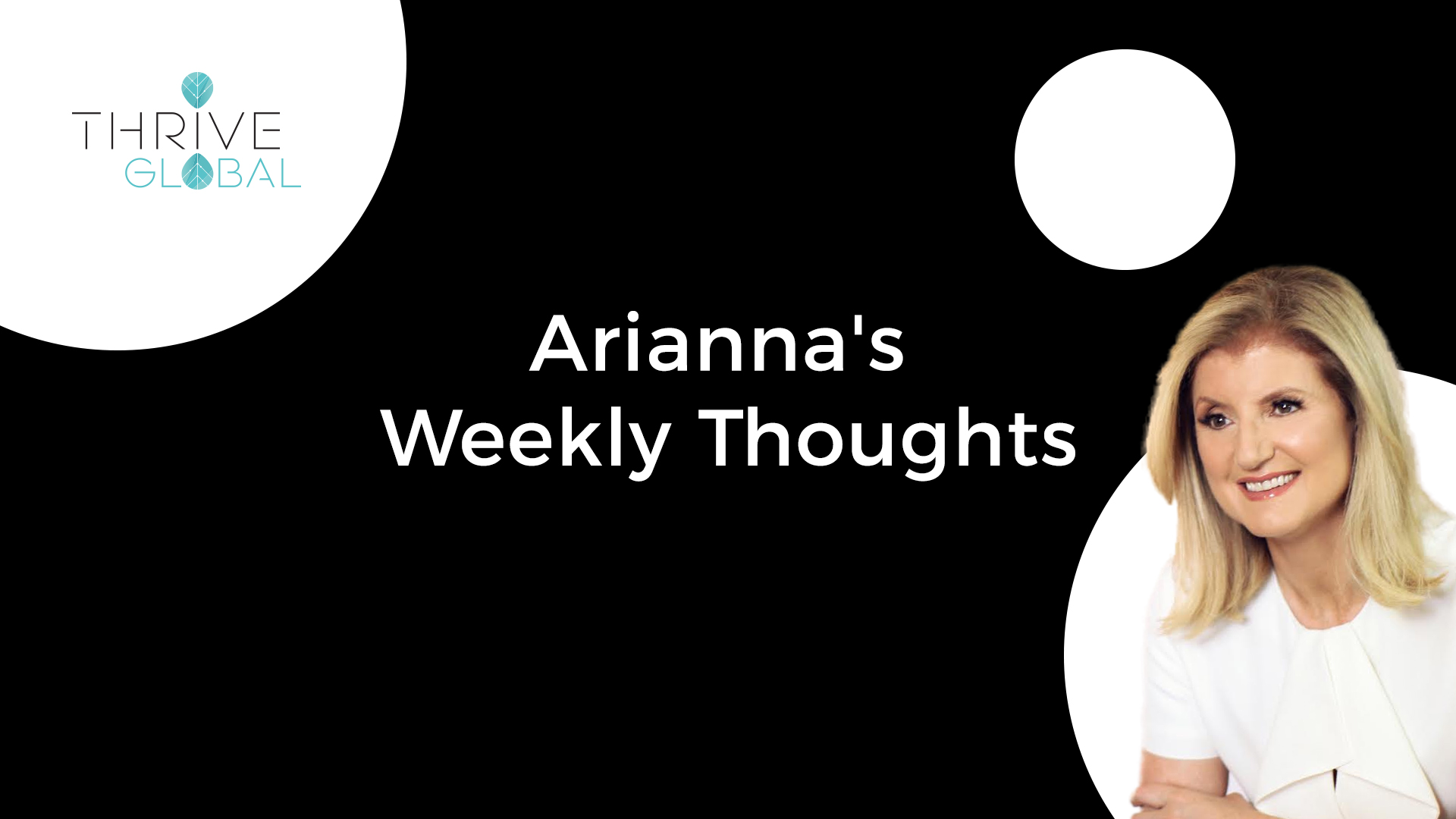In case you missed it, here’s the text of my new Weekly Thoughts newsletter. Each weekend I share my take on the week’s news stories, my favorite pieces on how we can thrive even in our stressful world, and some fun and inspiring extras. Subscribe here.
Nowhere to Go But Up: In Axios, Caitlin Owens writes about “health care’s imminent existential crises,” citing the looming problems of:
- Affordability, as premiums continue to rise.
- Access to health care, as rural hospitals continue to close.
- The growth of drug-resistant infections.
- The skyrocketing opioid epidemic.
- The health challenges that will be brought on by climate change.
It’s yet more evidence that we need to radically redefine how we think about health care. The elements of this perfect storm Owens lays out are all downstream symptoms of a much larger problem. Along with trying to figure out ways to give more people access to increasingly expensive treatment, we need to focus more on preventing people from needing such costly treatment in the first place. And we can do that by going upstream to the root causes of this existential crisis, which is the global epidemic of stress and burnout.
The Kids Are Not Alright — But They Might Force the Rest Of Us to Be Better: The bad news: Generation Z is the most anxious demographic in the country. The good news: Their entry into the workforce is forcing business to take mental health much more seriously. As the Wall Street Journal reports, measures include mindfulness and meditation training, stationing social workers among employees, one-on-one coaching sessions to prevent employees from constantly comparing themselves to others, and training employee volunteers to help when they see signs of anxiety.
Slam Dunk Science: If you’re currently watching the NBA playoffs, and especially if you’re betting on them (full disclosure: as Andre Iguodala and Kevin Durant are Thrive Global investors, we are remaining very neutral. Though go Warriors), you’ll want to read this fascinating study in the journal Sleep Health, on the connection between social media and performance. Researchers tracked the nighttime habits of 112 NBA players, and found that those who were on Twitter after 11 p.m. or before 7 a.m. scored lower in games the next day. So if you’ve got money riding on the playoffs, you might want to see which players are surfing Twitter late-night. And then put your phone down, too. If it affects elite athletes, imagine what it’s doing to the rest of us.
***

Congratulations Graduates. And Non-Graduates. It’s Commencement Season!
I love commencements. I love giving them. I love attending them. I love reading them. It’s like wisdom season — a time the whole culture comes together to really think about how to live The Good Life. Not how to be rich, or successful in the conventional way, but how to live a life you’ll look back on without regret, one in which how you spent your time and what gave your life meaning were roughly aligned.
It’s much better than New Year’s, where most of us make unrealistic resolutions without thinking of what’s much more important — the underlying architecture of how to get there. That’s what Commencement Season is all about — using the happy occasion of a new and eager flock (bevy? herd? quad?) of graduates being sent off into the world and eavesdropping on all the accumulated advice, inspiration and wisdom our culture has to offer them.
And it’s a season especially relevant for Thrive Global, which is built on the truth that it’s never too late to make changes to improve our lives. And we also know that the best way to make those changes is to start with a few small steps, which we call Microsteps.
So here are a few of my favorite commencement addresses I’ve seen so far, along with the Microsteps and Macrowisdom I’ve pulled from them. Even if you’re no longer wearing a cap and gown this season, and even if you can no longer fit into yours, there’s so much to absorb and apply from commencement wisdom. As Dr. Seuss put it in what could have been a great commencement address: “You have brains in your head. You have feet in your shoes. You can steer yourself any direction you choose. You’re on your own. And you know what you know. And YOU are the one who’ll decide where to go.”
Maverick Carter, co-founder, along with LeBron James, of Spring Hill Entertainment, Uninterrupted and The Robot Company, at USC’s Annenberg School for Communication and Journalism:
- Don’t fall into “opportunity stereotypes”: “Smart boys get their MBA. Smart girls go to law school. Asian kids don’t work in hip-hop. Mexican kids don’t work in tech. Basketball players risk losing endorsement deals by speaking out on social issues. Friends of basketball players are happy to just hang out and should accept they’re part of a posse. From the moment you walk off this campus, you’re going to feel pressure to make the safe, obvious professional choices. To do what you’re supposed to do, rather than explore and discover what you may actually want to do. I’m standing here today as a living testament to make sure you all know what makes the most sense may not even make sense at all.”
Ken Jeong, actor, at the University of North Carolina at Greensboro:
- Embrace the unexpected: “You guys are finishing up Act 1 of your film and your story. Figure out what Act 2 is, and embrace the change, embrace the twists and the unexpected turns.”
J.J. Watt, NFL player for the Houston Texans, at the University of Wisconsin:
- Don’t be afraid to be vulnerable and ask for help: “I broke down and cried [after an injury]. That’s the day that I learned that no matter how big you are, no matter how strong you are, no matter how tough you may be, everybody needs to ask for help at some point in their lives.”
- Learn from dark times: “Even on your darkest days, even throughout your nightmares when the sky is literally falling, you can learn from it. You can grow from it. There is a silver lining that you can find.”
Fareed Zakaria, at The Ohio State University:
- Expose yourself to diverse viewpoints. And step away from that Twitter fight: “We all need to get out of our echo chambers and talk to each other and respect one another. We must all listen and empathize more, and listening means listening to those with whom you fundamentally disagree. We must judge and condemn less: online, in print and in person.”
- Be thankful for those who got you here: “You will never understand how much your parents love you until you have children of your own. Once you do, all their strange, sometimes aggravating behavior — the calls, the emails, the texts, the unsolicited advice — will all strike you as understandable, acceptable and totally normal because you will be doing it yourselves.”
Tara Westover, author of the memoir Educated, at Northeastern University:
- Embrace your un-Instagrammable self: “I would like to pause for just a moment to appreciate the parts of you that you don’t put online. I would like to mount a rigorous defense of your boring, internal, book-reading, dish-washing, thought-having life. It’s a concept that I’m going to call ‘the un-Instagrammable self.’”
- Your off-screen life is your real life: “Everything of any significance that you will do in your life will be done by your un-Instagrammable self. It is, for example, your un-Instagrammable self who is graduating today. I’ve yet to see a Facebook or Instagram account which is devoted to photos of someone studying or attending lectures or writing essays.”
- Social media can make it harder to know ourselves: “Sometimes I think that when we deny what is worst about ourselves, we also deny what is best. We repress our ignorance, and thus we deny our capacity to learn. We repress our faults, and thus we deny our capacity to change. We forget that it is our flawed human self, not our avatar, who creates things, and reconsiders, and forgives, and shows mercy.”
***
Before You Go
Retroactive Commencement Wisdom: “12 Successful People on the Advice They Wish They Had Gotten When They Graduated”
Books of the week:
The Algebra of Happiness: Notes on the Pursuit of Success, Love, and Meaning, by Scott Galloway. Here the professor at NYU’s Stern School of Business lays out the real formula for the good life. It’s not about money or conventional career success, but our everyday relationships. “Check in with old friends as often as possible, express admiration to co-workers, and every day, tell as many people as you can that you love them,” he writes. “A couple of minutes every day — the payoff is small at first, and then it’s immense.”
Identity Leadership: To Lead Others You Must First Lead Yourself, by Stedman Graham. There is never a shortage of books on leadership in the business press. But as Graham shows, before we earn the authority to lead others, we have to do the hard work of leading ourselves. As he said at his book launch party — hosted in our Thrive Global offices — self-mastery is hard work. “If you really want to work on yourself you’ve got to go to the bottom of the pit. What were your experiences like growing up? What was your shame like growing up? You’ve got to go back and revisit that and you’ve got to unpeel the onion.”
Song of the Week: This week also saw the death of iconic actress and singer Doris Day. Hearing her most famous song this week, it struck me that’s it’s not a bad anthem for the newly resurgent trend of Stoicism:
Que será, será
Whatever will be, will be
The future’s not ours to see
Que será, será
What will be, will be
You can watch her sing it here.
Troubling Stat of the Week: Most parents know it’s unsafe to text and drive, but over half of them do it anyway.
Video of the Week: “Kabul’s first and only yoga studio is helping Afghan women find peace in a war-torn nation.” Watch it here.

Rethink, Rename: In this piece by psychotherapist Jonathan Alpert about ways to set boundaries with technology I love this suggestion to make a device-free zone in your home. Such a great idea, but the question is, what should call it? The No-Screen Porch? The Analog Area? Any suggestions? Send them here.
Quote of the Week: “”I think our world is going through a lot, obviously. But for my generation specifically, social media has been terrible.” — Selena Gomez, at the Cannes Film Festival.
Subscribe here for my Weekly Thoughts Newsletter, where you’ll find my take on the week’s news, my favorite pieces on how we can thrive even in our stressful world, and some fun and inspiring extras.


